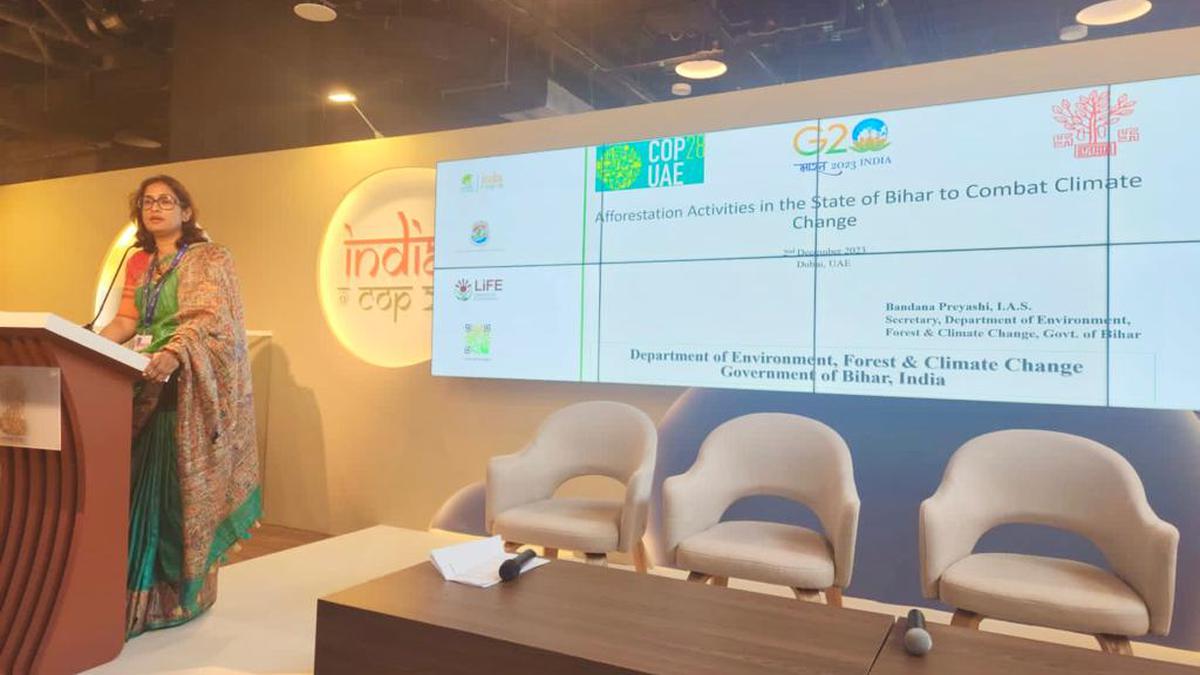The actions undertaken by the Bihar government in the field of afforestation, particularly through the Jal-Jeevan-Hariyali Abhiyan (Rural Development Department), received praise from the international community at the ongoing United Nations Climate Change Conference of the Parties (COP-28) in Dubai.
Bihar’s Holistic Approach to Afforestation
During a dedicated session on “Building Climate Resilience” at the Indian Pavilion, Ms. Preyashi and Mr. Singh delivered a detailed presentation titled “Afforestation Activities in Bihar to Combat Climate Change.” Ms. Preyashi highlighted the larger policy framework and inter-departmental coordination under Jal-Jeevan-Hariyali Abhiyan.
Bihar’s Holistic Vision
She emphasized Bihar’s holistic approach, stating, “The ‘Jal-Jeevan Hariyali Abhiyan’ initiated in 2019 reflects the inherent interconnectedness between water management, vegetation coverage, and the existence of life. With an 11-pronged strategy involving 15 government departments, the programme showcases a promising way to mitigate the adverse impacts of climate change.”
Remarkable Achievements in Water Conservation and Green Cover
Ms. Preyashi shared positive outcomes, stating, “The green cover in the State has increased from 9.9% in 2019 to 14.75% in 2021, with a total of 381.008 million plantations since 2012-13.” She also highlighted that the program resulted in the creation and restoration of over one and a half lakh water bodies in a span of four years, showcasing the program’s impact on water conservation.
Replicability of Bihar’s Model
She asserted that the experience of Jal-Jeevan-Hariyali Abhiyan could be replicated in regions vulnerable to climate change, such as South Asian countries and Sub-Saharan Africa, facing irregular floods and droughts, respectively. Bihar’s success story offers a model for other regions grappling with climate change impacts.
Green Budget Implementation
Furthermore, Ms. Preyashi pointed out the implementation of the green budget in Bihar since the fiscal year 2020-21. “Bihar is among the first States in the country to introduce a green budget, aiming to allocate budgetary provisions to address climate change, conserve the ecosystem, and protect biodiversity,” she said. This initiative showcases the state’s commitment to incorporating environmental considerations into its financial planning.
Collaboration with United Nations Environment Programme (UNEP)
Piyush Tripathi, Manager – Communication, Climate, World Resources Institute (WRI) India, highlighted the collaboration between the Bihar State Pollution Control Board (BSPCB) and the United Nations Environment Programme (UNEP) in February 2021 to develop climate-resilient and low-carbon development pathways for the state. This collaborative effort reflects Bihar’s commitment to seeking global expertise and support in its climate change initiatives.
Data-Driven Climate Strategy
Over the last two years, a technical consortium of internationally renowned organizations, including WRI India, has extensively collected data from more than 20 line departments, visited all 38 districts of the State, and organized over 350 meetings to develop the long-term climate strategy for the State. This comprehensive approach signifies Bihar’s dedication to evidence-based decision-making in its climate resilience efforts.
Important Questions Related to Exams
Q. What specific actions has the Bihar government undertaken in afforestation?
The Bihar government has initiated afforestation through the Jal-Jeevan-Hariyali Abhiyan, receiving global praise at COP-28.
Q. What is significant about Bihar’s green budget implementation since 2020-21?
Bihar is among the first states to introduce a green budget, allocating funds to address climate change, conserve ecosystems, and protect biodiversity.
Q. What collaboration took place between BSPCB and UNEP in February 2021?
The Bihar State Pollution Control Board collaborated with the United Nations Environment Programme to develop climate-resilient and low-carbon development pathways for the state.




 Jharkhand Budget 2026-27: ₹1.58 Lakh Cro...
Jharkhand Budget 2026-27: ₹1.58 Lakh Cro...
 Can Rural Women Save Tigers? Palamu’s Va...
Can Rural Women Save Tigers? Palamu’s Va...
 Big Boost for Ex-Agniveers: 20% Delhi Po...
Big Boost for Ex-Agniveers: 20% Delhi Po...








